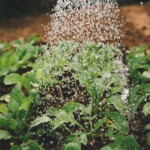Pesticides
 Pesticides include four major categories: herbicides, insecticides, fungicides and rodenticides to control weeds, insect pests, diseases and rodents, respectively. The first three types are used in the field while rodenticides are used in storage bins when needed. Pesticides are vital tools for farmers to maximize food production and among the most strictly regulated and highly tested products in the world. For global sustainable agriculture, it is essential for farmers to have access to these tools. The USCA supports current pesticide registrations and regulation by the U.S. Environmental Protection Agency (EPA). It is against restricting or banning the use of pesticides without risk assessment based on the latest science. The USCA encourages farmers to judiciously use pesticides according to label instructions and calls for emergency use of pesticides not labeled for canola or registered in certain growing areas in crisis.
Pesticides include four major categories: herbicides, insecticides, fungicides and rodenticides to control weeds, insect pests, diseases and rodents, respectively. The first three types are used in the field while rodenticides are used in storage bins when needed. Pesticides are vital tools for farmers to maximize food production and among the most strictly regulated and highly tested products in the world. For global sustainable agriculture, it is essential for farmers to have access to these tools. The USCA supports current pesticide registrations and regulation by the U.S. Environmental Protection Agency (EPA). It is against restricting or banning the use of pesticides without risk assessment based on the latest science. The USCA encourages farmers to judiciously use pesticides according to label instructions and calls for emergency use of pesticides not labeled for canola or registered in certain growing areas in crisis.
Coalition Letter on FY2025 Pesticide Appropriations 3.15.24
USCA Comments on Herbicide Strategy Framework for Endangered Species Act 10.27.23
Ag Group Comments on Herbicide Strategy Framework for Endangered Species Act 10.27.23
Letter to Congressional Appropriations Committees re: Pesticide Registrations 3.8.23
Letter to EPA re: Endangered Species Act and Pesticide Registrations 2.14.23
Letter to President Biden Calling for Ban on Glyphosate Labeling by State 5.23.22
250+ coalition letter to Congress re: opposition to S. 3283 and support of FIFRA 1.10.22
Coalition letter to Senators about support for FIFRA and pesticide availability 9.15.20
Letter to EPA on NRDC petition to revoke all neonicotinoid tolerances 8.28.20
Support for EPA to re-register neonicotinoid pesticides 5.4.20
Comments to EPA on planted seeds treated with systemic insecticides 3.22.19
Comments to EPA on re-registration of glyphosate herbicide 4.30.18
Comments to EPA on re-registration of neonicotinoid insecticides 4.20.18
Comments to EPA on re-registration of pyrethroid and pyrethrin insecticides 7.7.17
Letter to EPA on Imidacloprid registration review 4.14.16
Letter to EPA on proposal to reduce exposure to bees from acutely toxic pesticides 8.21.15